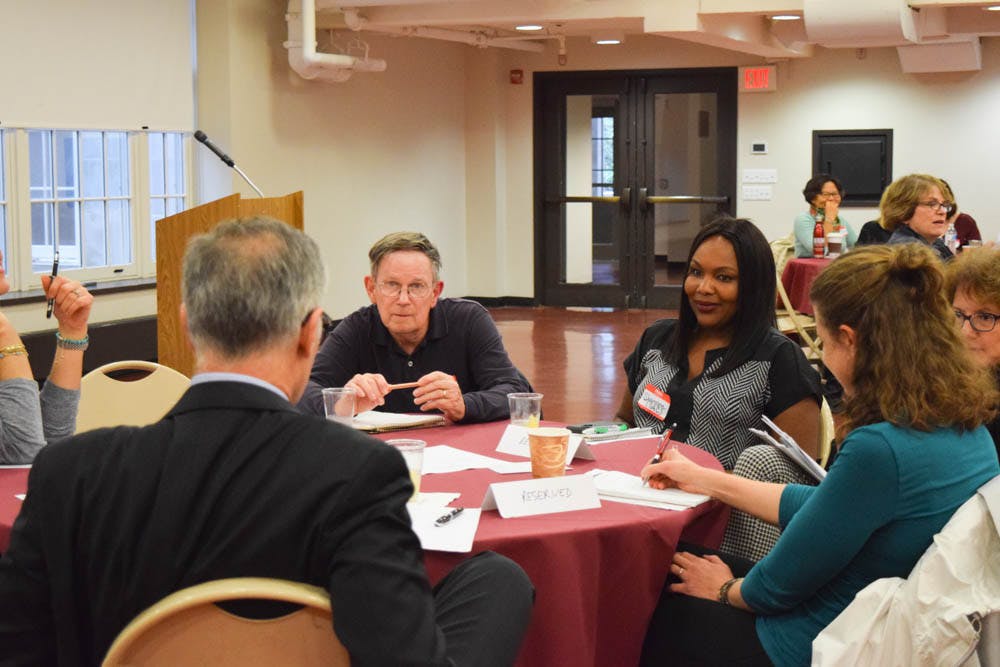Resistance to change, lack of respect and few opportunities for job advancement characterize the work environment for University staff, said several members of the Brown University Community Council and Staff Advisory Council during Tuesday’s BUCC meeting.
Led by President Christina Paxson P’19, the discussion on campus culture centered primarily around what most attendees expressed to be an inhibitive, “exhausting” and “inequitable” environment for staff members. Since a spring 2016 staff climate survey that “indicated only 52 percent of respondents felt they were treated with respect by faculty,” the University has moved to qualitatively study staff climate and further address the issues highlighted in the survey data, The Herald previously reported.
Respect may mean different things to different people, said one staff member. The names of all staff members have been kept anonymous as a condition of reporting on the meeting.
“Some people might see respect as, … ‘You respect my authority,’ whereas other people see respect as ‘you respect me as a person,’” added another discussion participant.
Because faculty and staff get busy at different times of the year, misunderstandings of availability and stress level can “make people feel disrespected,” said one participant. For example, faculty often see the end of the semester as downtime, while facility staff and event planners are often most overworked during that time, he added.
Faculty are never evaluated on how they manage staff, one BUCC member noted.
Support and consideration of outside lives, including commuting, the need for flexibility and professional development, could all add to a more inclusive environment, multiple discussion participants said.
“I want Brown to be a place where … everybody wakes up and says, ‘Brown is the place I want to work,’ … and I don’t think we’re quite there,” Paxson said. “We can’t achieve … academic excellence … unless we have an equally excellent organizational structure,” she added. The University often focuses on mentorship for students, but there is little emphasis on mentorship for staff, one staff member said. “If what’s good for staff is good for everyone, mentorship is something that should be available to everybody,” the staff member said.
The need for better manager training was also a recurring theme in the discussion. Several staff members said supervisors can be disrespectful and fail to provide opportunities for advancement. Staff should “know that their managers are being held accountable for how they manage,” said one staff member.
Professional development also varies across staff departments, another discussion participant said. Many attendees expressed their discontent with opportunities for advancement and development. “People aren’t being challenged. … (They are) kind of stuck without a lot of growth. There could be more of a career ladder,” said one staff member.
Some attendees expressed an interest in “permeability,” which would allow staff members to partner with different departments and utilize skills or talents that are otherwise ignored. A strict job hierarchy has made staff members feel that “access is often not equitable,” said one staff member. When staff lower in the hierarchy have ideas for change, those ideas “seem to get squashed” as they move up the ladder, he added.
“We feel like there are different internal cultures” and staff have widely varying experiences, said a staff member, adding that different experiences create inequity. For example, one manager may give paid vacation for a certain religious holiday, while another may not, she said.
The discussion often touched upon what many see as complex and inefficient bureaucracy. “It’s hard to make change here,” said one discussion participant. “At the same time, there’s a lot of interest in making change.”
While staff members often experience a “complicated and bureaucratic environment,” they also feel highly “creative,” said one staff member, adding that “perhaps one breeds the other.”
At the end of the meeting, Paxson also touched upon this morning’s launch of a new daily digest — called Today@Brown — and the recent arrival of students and scholars from the University of Puerto Rico. Russell Carey ’91 MA’06, executive vice president for planning and policy, noted that staff will move in the first of three waves to new South Street Landing offices in the Jewelry District this weekend.





